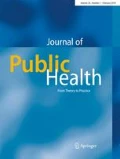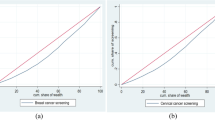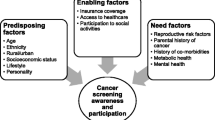Abstract
ᅟ
Primary health care reflects a country’s health level in relation to the current social and economic conditions according to the Declaration of Alma Ata (1978). Secondary prevention activities (Pap smear test, mammogram) promote public health through the early diagnosis of a disease. Since 2011 in Greece, due to the financial crisis, a significant reduction of national public health funding has occurred, along with substantial annual family income suppression and an increasing use of public health services.
Aim
To investigate the socio-economic features of women participating in secondary prevention of breast and cervical cancer in an austerity setting.
Method
Cross-sectional study in 225 women through an anonymous self-administered questionnaire in the outpatient clinic of a large anti-cancer hospital in Athens.
Results
The majority of participants (56.9%) are unemployed and 24.1% declare no income. The main reason for choosing a state hospital is purely financial (55.1%). Women with higher educational level are 1.85 times more likely to get regular Pap smear tests (p = 0.026) compared to less educated women, and they also have the highest percentage (85.1%) of getting regular mammograms.
Conclusion
The financial crisis is complex and several factors affect all levels of the health system. Greece has no organised population-based screening programme. Mean annual income and education level determine participation in cancer screening in women visiting a major state anticancer hospital. Moreover, reduced public health spending in a prolonged austerity setting will hinder the participation of unemployed and less educated women in regular preventive activities, thus breaching the human right to access to health prevention.
Similar content being viewed by others
Reference
Alliance for Cervical Cancer Prevention ACCP (2002). Pap smears: An important but imperfect method. Cervical Cancer Prevention Fact Sheet. http://screening.iarc.fr/doc/RH_pap_smears.pdf. Accessed 25 November 2016
Boscoe FP, Henry KA, Sherman RL, Johnson CJ (2015) The relationship between cancer incidence, stage and poverty in the United States. Int J Cancer 139(3):607–12s. doi:10.1002/cncr.28509
Danishevski K, McKee M (2005) Reforming the Russian health-care system. Lancet 365(9464):1012–4. doi:10.1016/S0140-6736(05)71120-X
Epidemiological guidelines for quality assurance in breast cancer screening (2004) 4th edn. European Commission, ISBN 92-79-01258-4
Faresjö Å, Theodorsson E, Chatziarzenis M, Sapouna V, Claesson HP, Koppner J, Faresjö T (2013) Higher perceived stress but lower cortisol levels found among young Greek adults living in a stressful social environment in comparison with Swedish young adults. PLoS One. doi:10.1371/journal.pone.0073828
IARC (2004) Cervical cancer prevention http://screening.iarc.fr/doc/RH_fs_risk_factors.pdf Accessed 26 November 2016
Jena AB, Huang J, Fireman B, Fung V, Gazelle S, Landrum MB, Chernew M, Newhouse JP, Hsu J (2016) Screening mammography for free: impact of eliminating cost sharing on cancer screening rates. Health Serv Res. doi:10.1111/1475-6773.12486
Kaitelidou D, Kalogeropoulou M, Katostaras T, Minogiannis P, Skitsou A, Siskou O, Liaropoulos L (2014) Process mapping to capture breast cancer patients’ journey in Greek public oncological hospitals. Value Health 17(7):A653–4. doi:10.1016/j.jval.2014.08.2381
Kondilis E, Giannakopoulos S, Gavana M, Ierodiakonou I, Waitzkin H, Benos A (2013) Economic crisis, restrictive policies, and the population’s health and health care: the Greek case. Am J Public Health 103(6):973–9. doi:10.2105/AJPH.2012.301126
Kyriopoulos I, Zavras D, Skroumpelos A, Mylona K, Athanasakis K, Kyriopoulos J (2014) Barriers in access to healthcare services for chronic patients in times of austerity: an empirical approach in Greece. Int J Equity Health 13-54. doi: 10.1186/1475-9276-13-54
Lauby-Secretan B, Scoccianti C, Loomis D, Benbrahim-Tallaa L, Bianchini F, Straif K (2015) Breast-Cancer Screening—Viewpoint of the IARC Working Group. N Engl J Med 372:2353–2358. doi:10.1056/NEJMsr1504363
Maliarou M, Sarafis P (2012) Financial crisis. How it affects the public health and health systems. Rostrum of Asclepius http://www.vima-asklipiou.gr/volumes/2012/VOLUME%2002_12/VA_REV_5_11_02_12.pdf. Accessed 26 Nov 2016
Papaevangelou V, Koutsoumbari I, Vintila A, Klinaki E, Zellos A, Attilakos A, Tsolia M, Kafetzis D (2014) Determinants of vaccination coverage and adherence to the Greek national immunization program among infants aged 2-24 months at the beginning of the economic crisis (2009-2011). BMC Public Health 14:1192. doi:10.1186/1471-2458-14-1192
Patelarou A (2011) The consequences of the financial crisis on health: Proposed interventions. J Nursing Sci 4(3):53–61
WHO (2013) 10 Facts on Cancer. http://www.who.int/features/factfiles/cancer/en/. Accessed 20 November 2016
WHO (2015) Cancer http://www.who.int/mediacentre/factsheets/fs297/en/. World Health Organisation. Accessed 20 November 2016
Acknowledgements
The authors would like to thank all the women who participated and the staff in the clinics of the “Saint Savvas” Anti-cancer Hospital.
Publisher’s Note
Springer Nature remains neutral with regard to jurisdictional claims in published maps and institutional affiliations.
Author information
Authors and Affiliations
Corresponding author
Ethics declarations
Conflict of interest
None stated.
Funding
The present study received no funding from any source.
Conflict of interest
All authors declare no conflict of interest.
Ethical approval
This article does not contain any studies with animals performed by the authors. Informed consent was obtained from all individual participants included in the study.
Rights and permissions
About this article
Cite this article
Riza, E., Chrysi, M., Vaidakis, D. et al. Does socio-economic status in Greece affect participation in cancer screening programmes during the period of financial crisis?. J Public Health 25, 417–424 (2017). https://doi.org/10.1007/s10389-017-0793-4
Received:
Accepted:
Published:
Issue Date:
DOI: https://doi.org/10.1007/s10389-017-0793-4




